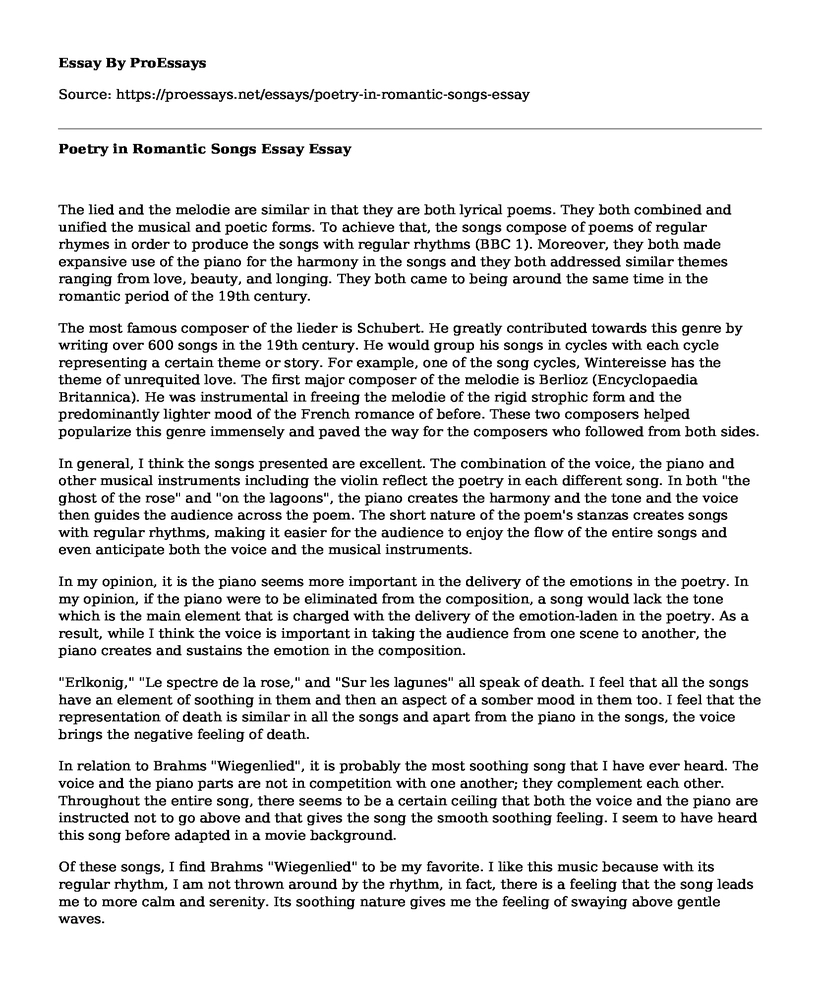The lied and the melodie are similar in that they are both lyrical poems. They both combined and unified the musical and poetic forms. To achieve that, the songs compose of poems of regular rhymes in order to produce the songs with regular rhythms (BBC 1). Moreover, they both made expansive use of the piano for the harmony in the songs and they both addressed similar themes ranging from love, beauty, and longing. They both came to being around the same time in the romantic period of the 19th century.
The most famous composer of the lieder is Schubert. He greatly contributed towards this genre by writing over 600 songs in the 19th century. He would group his songs in cycles with each cycle representing a certain theme or story. For example, one of the song cycles, Wintereisse has the theme of unrequited love. The first major composer of the melodie is Berlioz (Encyclopaedia Britannica). He was instrumental in freeing the melodie of the rigid strophic form and the predominantly lighter mood of the French romance of before. These two composers helped popularize this genre immensely and paved the way for the composers who followed from both sides.
In general, I think the songs presented are excellent. The combination of the voice, the piano and other musical instruments including the violin reflect the poetry in each different song. In both "the ghost of the rose" and "on the lagoons", the piano creates the harmony and the tone and the voice then guides the audience across the poem. The short nature of the poem's stanzas creates songs with regular rhythms, making it easier for the audience to enjoy the flow of the entire songs and even anticipate both the voice and the musical instruments.
In my opinion, it is the piano seems more important in the delivery of the emotions in the poetry. In my opinion, if the piano were to be eliminated from the composition, a song would lack the tone which is the main element that is charged with the delivery of the emotion-laden in the poetry. As a result, while I think the voice is important in taking the audience from one scene to another, the piano creates and sustains the emotion in the composition.
"Erlkonig," "Le spectre de la rose," and "Sur les lagunes" all speak of death. I feel that all the songs have an element of soothing in them and then an aspect of a somber mood in them too. I feel that the representation of death is similar in all the songs and apart from the piano in the songs, the voice brings the negative feeling of death.
In relation to Brahms "Wiegenlied", it is probably the most soothing song that I have ever heard. The voice and the piano parts are not in competition with one another; they complement each other. Throughout the entire song, there seems to be a certain ceiling that both the voice and the piano are instructed not to go above and that gives the song the smooth soothing feeling. I seem to have heard this song before adapted in a movie background.
Of these songs, I find Brahms "Wiegenlied" to be my favorite. I like this music because with its regular rhythm, I am not thrown around by the rhythm, in fact, there is a feeling that the song leads me to more calm and serenity. Its soothing nature gives me the feeling of swaying above gentle waves.
Works Cited
BBC. Lieder. 2014. 6 June 2018 http://www.bbc.co.uk/schools/gcsebitesize/music/western_tradition/lieder1.shtml
Encyclopaedia Britannica. Melodie. 2018. 6 June 2018 https://www.britannica.com/art/melodie
Cite this page
Poetry in Romantic Songs Essay. (2022, Jun 06). Retrieved from https://proessays.net/essays/poetry-in-romantic-songs-essay
If you are the original author of this essay and no longer wish to have it published on the ProEssays website, please click below to request its removal:
- Tinikling Dance and Its Benefits
- The Effects of Music Therapy on the Cognitive Functions
- The Grapes of Wrath Chapters Analysis Paper Example
- Essay Sample on Marvin Gaye: Music Icon of the 20th Century
- The Super Bowl: A Sports Fan Event of Significance - Essay Sample
- Reading vs. Watching: Which is Better? - Paper Example
- Free Paper Example: Dramatic Exploration in Wajdi Mouawad's Scorched







